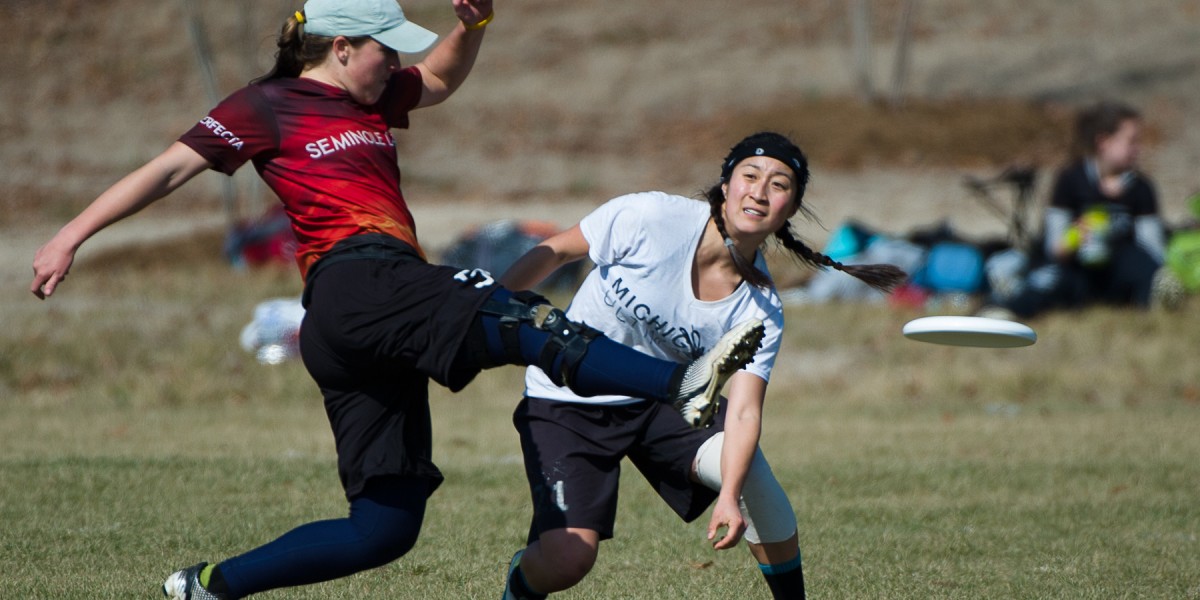 UltiPhotos.com" />
Kevin Leclaire - UltiPhotos.com
UltiPhotos.com" />
Kevin Leclaire - UltiPhotos.com
I stepped out onto the grassy fields of Sarasota, Florida in October of 2009 as one of seven final players to battle it out against Slow White on universe point. I looked at the opposing team and could feel my heart pounding against my chest wall, palms slightly sweaty, and adrenaline pumping through my veins. If we scored this point we would be playing in the quarterfinals of Club Nationals the following day. I didn’t want to think about the overwhelming feeling of disappointment if we failed. Instead I told myself to take a slow, deep breath… and go.
I know breathing is an important part of playing ultimate. I use it as a way to stay focused and keep my adrenaline from getting out of control. When I am too nervous, standing on that white line and wondering what the next 90 minutes will bring, taking a breath pushes those feelings aside. I’m ready. Let’s do this.
Yet for a long time, I also struggled with breathing. During practice the same year we played against Slow White, I started to feel strange. My throat began to close and I couldn’t get enough air into my lungs. I tried to calm down, tried to soften my breath, but the feeling of drowning was too overwhelming. Concerned, I went to the University Health Clinic and was asked a laundry list of questions. Had this happened before? No. Did you have asthma as a kid? No. Do you know what exercise-induced asthma is? Not really. They gave me an albuterol inhaler and sent me on my way.
Years passed and I continued to struggle, especially when I trained during club seasons. Mile runs felt like marathons, with every inhalation sending stabbing pains to my lungs. The inhaler I received at the clinic didn’t work, so I stopped using it. I was so frustrated with myself that I started to think that the doctors were wrong. It wasn’t some medical problem that could be fixed with medication. It was me. I was weak.
I decided to do something about it this past year. I went to see the physician’s assistant at our clinic in Yosemite and told him what was going on. After some tests, which involved sprinting up and down the clinic’s driveway until I could barely breathe, he sat me down and said that it wasn’t exercise-induced asthma. It was actually vocal cord dysfunction, which mimics the symptoms of exercise-induced asthma so well that doctors often misdiagnose patients. He handed me a new inhaler and said to try it out. I shrugged, thinking it wouldn’t work, then went home, slipped on my running shoes, put a leash on my dog, and started to run. And I kept running. I was so excited not only to be able to breathe again but also to have finally found out what was wrong.
But the breathing games were not over. A few weeks ago, I met with an old teammate of mine, who is also a trainer here in Tucson. I thought we would be talking about workouts and ways I could improve my training schedule. But the first words out of his mouth weren’t about endurance, strength, or speed. They were about breathing.
“Breathing is such an important part of ultimate,” he said. “Recovery is key and beginning to understand the importance balancing your tension and relaxation comes down to the way you breathe. It is a true skill we have lost; as our lives create heavy amounts of tension, good or bad, our body has the same response. Being able to control it will separate you from the rest.”
He told me the next time I went to practice, I needed to play the breathing game. Every time I match up against someone, I needed to recover and slow my breathing faster than she did. If I did, I won. If I didn’t, I had to try again. I went to practice the following day, wondering what would happen. And I have to say, I have never seen such a drastic change in the way I played ultimate. It wasn’t about being more skilled, or faster than someone. It was about playing a game during every rest where all you had to do was focus on breathing. Just take a slow, deep breath… and go.







Comments Policy: At Skyd, we value all legitimate contributions to the discussion of ultimate. However, please ensure your input is respectful. Hateful, slanderous, or disrespectful comments will be deleted. For grammatical, factual, and typographic errors, instead of leaving a comment, please e-mail our editors directly at editors [at] skydmagazine.com.